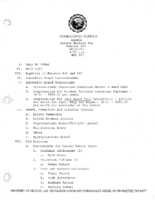Search the Special Collections and Archives Portal
Search Results

Meeting minutes for Consolidated Student Senate, University of Nevada, Las Vegas, June 21, 1983
Date
Archival Collection
Description
Text

Transcript of interview with Lee Cagley by Claytee D. White and Stefani Evans, August 08, 2016
Date
Archival Collection
Description
Lee Cagely, an interior designer and professor who designed some of the most iconic hotels in Las Vegas, Nevada, was born in the Panama Canal Zone on January 31, 1951. His father Leo was a civil engineer for the Panama Canal Company and his mother Charlotte worked as a receptionist. After his father left his job in Panama, Lee spent his childhood in Dallas, Texas; Tulsa, Oklahoma; and Des Moines, Iowa. He started to attend Rice University for architecture, but he chose to leave before completing his degree. He returned to college a few years later and graduated from Iowa State University with a degree in interior design in 1975. While his first California jobs were in restaurant design, he quickly moved on to airports and hotels and moved to Las Vegas in 1990 after associating with Marnell Architecture. Cagley is known for his designs in the Rio All-Suite Hotel and Casino, Ceasars Palace Atlantic City, the Mirage, and the Bellagio Resort & Casino. He is currently Chair of the Iowa State University College of Design and is principal designer for Lee Cagely Design. Here, Cagley explains the importance of keeping the various pieces of the infrastructure of a resort—including landscape architecture, architecture, interior design, all kinds of HVAC [heating, ventilation and air conditioning] concerns, housekeeping, food service, maintenance, etc.-invisible in order to maximize the visitor experience. At the same time he illustrates through several examples how resort design does not happen in a vacuum-it is instead part of a complex team that works together to create the whole. He also describes the challenges the Las Vegas resort industry finds in creating the very best visitor experience for a broad range of groups-from Millennials to their Boomer grandparents and all the generations in between.
Text

Transcript of interview with Patrick Gaffey by Stefani Evans and Claytee D. White, August 19, 2016
Date
Archival Collection
Description
One cannot talk about the arts in Southern Nevada without speaking of Patrick Gaffey. The Cincinnati, Ohio, native moved to Las Vegas as a child and has served the local arts community in several roles nearly his entire adult life, retiring soon after this interview as cultural program supervisor for the Clark County Parks & Recreation Department. After earning his Bachelor's and Master's degrees in English at the University of Nevada, Reno, Gaffey married Cynthia Pearson in 1968. In 1981 he began working as a publicist for the Allied Arts Council of Southern Nevada, founding its acclaimed magazine, Arts Alive, and remaining with the organization through its several moves until 1991. In this interview, he speaks to the collaborative nature and long vision of the Southern Nevada arts and architecture community through the founding of Discovery Children's Museum and the Neon Museum and of working with farsighted public entities—the Las Vegas-Clark County Library District, Clark County,
Text

Transcript of interview with Bruce L. Woodbury by Stefani Evans, September 27, 2016
Date
Archival Collection
Description
As Bruce Woodbury reflects on his twenty-eight years as Clark County's longest-serving County commissioner (1981–2009) he recalls serving with about thirty different commissioners. Surprisingly, "only seven of us got major jail sentences." He ruminates how Federal Bureau of Investigation probes Operation Yobo in the early 1980s and G Sting in the early 2000s exposed several Clark County politicians who succumbed to greed. While Woodbury considers honesty in office a given, his values were not held by all of his colleagues. One Operation Yobo recording caught a fellow commissioner responding to the query, "How about Woodbury?" with, "No, you can't touch him with a ten foot pole." Woodbury remembers his "campaign guys really liked that." Apparently the voters did as well, as he consistently won re-election. The Las Vegas native, who was raised in the John S. Park neighborhood and attended Las Vegas schools, earned his Bachelor's degree at the University of Utah and his Juris Doctorat
Text

Transcript of interview with Ronald "Ron" Lurie by Stefani Evans and Claytee D. White, October 17, 2016 and November 10, 2016
Date
Archival Collection
Description
Ron Lurie is a product of Las Vegas. Ron Lurie knows Las Vegas. The Los Angeles native arrived in Las Vegas with his parents when he was twelve years old; his father opened Market Town next to White Cross Drug Store. Lurie graduated from Las Vegas High School in 1958 and attended Nevada Southern, where he played baseball and basketball before joining the United States Army Reserves. Returning from training, he began working at a new store, Fantastic Fair. Soon the owner, builder Lloyd Whaley, asked him to manage a new Fantastic Fair. At 24 years of age, he managed the entire Fantastic Fair store, which later became Wonder World. Over time, Lurie would manage three of the four Wonder World stores. In this interview, the former mayor of the City of Las Vegas and former Las Vegas City Council member talks about running for City council because he wanted more parks and ball fields downtown and about his political career, which coincided with the years of explosive growth in the 1970s and 1980s. The current vice president and general manager of Arizona Charlie's also v discusses his careers in the grocery business and in gaming; he speaks to giving back to the community and the changing demography of the area surrounding Arizona Charlie's; he talks of the ways Steve Wynn pioneered an aura of glamour that helped to upgrade Downtown Las Vegas; he recalls the challenges of public safety, regional transportation, flood control, and the Monorail and of civic dreams of a magnetic levitation train that would connect Downtown Las Vegas to Cashman Field. He remembers his parents and his wife; he talks about his children, and he shares vignettes of, among many others, Ernie Becker IV, Bill Briare, Al Levy, Steve Miller, and Bob Stupak. Throughout, Mayor Lurie especially beams when he talks about his family, his friends, his work, Las Vegas, the Boys and Girls Clubs, and baseball. This man loves baseball.
Text

Craig Galati Interview, October 24, 2016: transcript
Date
Archival Collection
Description
always thought I'd be more urban. I would live in a downtown city. I wouldn't have a car. I would walk around. I would work on these big skyscrapers.” At one point in his life, architect Craig Galati dreamt of designing large buildings in some of the nation’s biggest cities. Instead, he was drawn back to his childhood home of Las Vegas, where he created projects meant to preserve the city’s integrity, such as the Grant Sawyer State Office Building and the first building at the College of Southern Nevada Charleston Campus. He speaks to his work in preservation at the Las Vegas Springs Preserve and in welcoming visitors to Mount Charleston with his Spring Mountains Visitor Gateway design. In this interview, Galati talks about his parents’ decision to move from Ohio to Nevada and what it was like growing up in Las Vegas. He recalls his first teenage jobs in the Las Vegas of his youth and his studies in architecture at the University of Idaho. He recounts the dilemma of struggling to find architecture work he enjoyed and how that vision drew him back to Vegas. He describes various projects in his portfolio from his early years to the present. He speaks highly of his partnership with Ray Lucchesi and the basis for their vision: “We wanted to be a place that everybody liked to work for. Buildings were just tools to do something grander. They weren't an object. We had a philosophy that was not object based, it was people based.”
Text

Transcript of interview with Joe M. Wilcock by Claytee White, April 17, 18, & 30, 2014
Date
Archival Collection
Description
Chef and longtime gaming executive Joseph “Joe” Wilcock was born in Detroit and raised by his mother, Ruby, and stepfather, Ross Johnson, in Sarasota, Florida; Gary, Indiana; and Harlan, Kentucky. After he graduated from high school in Gary he moved to Chicago to attend Washburne Culinary Institute. While attending Washburne Joe worked at Chicago’s Drake Hotel and lived at the Sears YMCA. After earning his certificate from Washburne, Joe worked at the newly opened Holiday Inn in Chicago, the Sea View hotel in Bal Harbour, Florida, and a resort at Blowing Rock, North Carolina. At Blowing Rock he heard about the new School of Hotel Management at UNLV and in August 1969 23-year-old Joe headed for Las Vegas with $400 in his pocket. Las Vegas was a disappointment. Joe could not get a job as a chef without first joining Culinary Workers Union Local 226-which he could not afford to do. Also, because he ran a poker game and cooked at the Chuck Wagon Diner during high school his high school grade point average was roughly a C-, which hindered his admittance into the School of Hotel Management. Undaunted, Joe found a job bussing tables at the Frontier Hotel and joined the Culinary Union so he could work as a chef. He also took three classes at UNLV that semester, earned an A in each, and was admitted to the School of Hotel Management. While at UNLV he affiliated with Sigma Chi fraternity. In his career Joe has worked in all facets of the gaming industry in such Las Vegas properties as the Flamingo Capri, the Frontier, Caesars Palace, the Tropicana, the Dunes, the Golden Nugget, the Mirage, Treasure Island, the Sands, MGM, and the Downtown Grand. He learned the business from the ground up. He also worked at Caesars Tahoe and at different times owned and operated a sandwich shop and a bar. Joe married his wife, Linda, 38 years ago in Las Vegas, in 1976. He is currently employed as a casino shift manager at the Downtown Grand hotel and is affiliated with the House Corporation of Sigma Chi Alumni, UNLV Rebel Golf, the Las Vegas Natural History Museum, and Candlelighters Childhood Cancer Foundation of Nevada.
Text

Leonard M. Jessup interview, August 6, 2018: transcript
Date
Description
“I decided to just keep going, and I devoted my career to higher ed. I wanted to continue putting back into this system that I felt I got a lot out of. Again, repaying a debt.” What began as a passion for playing school sports would later lead Dr. Len Jessup on a path to lifelong service in the area of higher education. From his California childhood he would soon find himself across different U.S. states performing various higher education duties from professor to university president. In this interview, Jessup talks about his grandparents’ decision to emigrate from Italy to the U.S. and how grateful he feels towards his family as a result. He recalls playing baseball in college. In his eyes, being part of several sports teams helped him develop into the person he is now. He describes doing research during at the University of Arizona and speaks to what it was like moving from one university position to the next. Ultimately, his colleagues would recommend that he move to Las Vegas to
Text

Transcript of interview with Frankie Perez by Elsa Lopez and Laurents Bañuelos-Benitez, November 5, 2018
Date
Archival Collection
Description
Frankie Perez (1986- ) is an individual that constantly found himself navigating two worlds, whether it was military versus civilian; female versus male; or being Latinx in the United States. As a result of this navigation, Perez has a unique perspective on our ever more complicated world that not many individuals possess. Perez served in the military during the Do Not Ask, Do Not Tell policy which made it difficult for someone dealing with gender identity, to seek out the proper support they need. Despite the policy, and other policies that were put in place afterwards to inhibit the transgender community in the military, Perez began his transition while still serving his country. In direct contradiction of popular opinion, Perez discovered that the military easily accommodated his transition. Outside of the military Perez is an active voice in the LGBTQ community. As a member of the LGBTQ, Latinx, and military community, Perez has a unique perspective that he uses to fight for both LGBTQ and Latinx rights. Currently, Perez is finishing his degree in gender and sexuality studies at UNLV. He hopes to use his education to help people have the difficult discussions and improve conditions for his communities.
Text

Transcript of interview with Randy Garcia by Laurents Bañuelos-Benitez, November 27, 2018
Date
Archival Collection
Description
Randy Garcia is the founder and CEO of the investment management-consulting firm, The Investment Counsel Company. Born in Los Angeles on Feb. 21, 1954, Garcia’s family moved to Las Vegas in 1957. The son of a World War II vet and a homemaker, Garcia’s ancestral roots come from Mexico, Italy, and Spain. He grew up in Las Vegas during segregation and expansion. He remembers a time when much of city included dirt lots and casinos that no longer stand. A champion in serving under privileged youth and communities across southern Nevada, Garcia lives by the philosophy, “give until it hurts.” Garcia uses his success as a wealth manager to promote, foster, and cultivate positive change for the Latinx community in Las Vegas. His story and dedication to his community is a pinnacle of hope and benevolence for current and future generations. Garcia became the first in his family to attend and graduate college. He graduated from UNLV in 1977 with honors, where he majored in business administratio
Text
